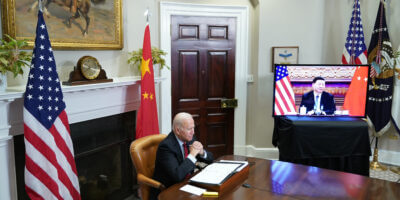
GlobalFoundries wants a piece of the US CHIPS Act. (Image – Shutterstock)
GlobalFoundries opens Malaysian office, seeks funding from U.S. CHIPS act
- GlobalFoundries has applied for funding from the U.S. CHIPS Act.
- The company recently signed a new 10-year-contract with the U.S. Department of Defense.
- GlobalFoundries has also opened a new office in Penang, Malaysia.
As one of the world’s leading semiconductor manufacturers, GlobalFoundries continues to redefine innovation in the semiconductor field by developing and improving its design and fabrication services. The company has a strong footprint in the U.S., Europe and Asia.
In Southeast Asia, GlobalFoundries has significantly increased its investments. In Malaysia, the company has officially opened a new hub facility in Penang. As well as creating 300 high-value manufacturing support positions, the hub is equipped with cutting-edge digital manufacturing technologies, including remote access and industry 4.0 solutions.
According to Kay Chai Ang, Chief Manufacturing Officer at GlobalFoundries, the Penang facility will provide round-the-clock support to the company’s global manufacturing sites in Singapore, the U.S. and Europe. Put simply, all of GlobalFoundries’ operations can be remotely controlled from the Penang facility, ensuring supply chain resilience and sustainability.
Apart from the new office in Malaysia, there was also the opening of a new fabrication (fab) plant in Singapore several weeks ago. The US$4 billion expansion fab, which spans 23,000 square meters is expected to generate some 1000 high-value job opportunities in the country.
The expansion is also expected to significantly enhance the semiconductor company’s global manufacturing capacity, reinforcing GlobalFoundries’ ability to provide product security and flexibility to customers across its manufacturing sites. The Singapore expansion fab is also the most advanced semiconductor facility in the country. It’s capable of producing an additional 450,000 wafers (300mm), which will also elevate the company’s overall Singapore capacity to more than 1.5 million wafers each year.

Part of a strategic hub network, this facility will provide fundamental round-the-clock support for GlobalFoundries’ global manufacturing operations.
Semiconductor industry in Southeast Asia
GlobalFoundries’ expansion in Southeast Asia is a testament to the booming semiconductor industry in the region. Malaysia is currently the top semiconductor producer in the region, with Singapore and Vietnam catching up quickly.
The growth of the industry in the region also requires more talent in the field. Singapore for example, has invested heavily in R&D, infrastructure, and talent development to build a vibrant semiconductor ecosystem as it aims to grow its manufacturing industry by 50% by the end of 2030.
Malaysia also hopes to achieve a 15% market share in the semiconductor and electronics industry by 2030, up from 13%. The state of Penang, which has long been the preferred location for semiconductor companies, strives to provide continuous assistance and facilitation for all investors on the island while spearheading the development of a sustainable industrial ecosystem.
“In the area of workforce development, SEMI launched the global SEMI University online learning management system in February. And at SEMI Southeast Asia, we continue to implement talent initiatives to strengthen the region’s position as a global manufacturing hub,” highlighted Linda Tan, President of SEMI Southeast Asia.
Meanwhile, Vietnam has seen investments in semiconductors increase as well in recent months. Just a few weeks ago, U.S. President Joe Biden was in Vietnam, securing deals with the country on semiconductors and minerals.
Given China’s dominance in the semiconductor industry, the U.S. feels Vietnam and the rest of Southeast Asia play an important role in their strategy to secure global supply chains from China-related links.

GlobalFoundries wants to be part of the U.S. CHIPS Act.
GlobalFoundries and the US CHIPS Act
Last year, President Biden also signed the U.S. CHIPS Act into law. The CHIPS Act is a US$52.7 billion package to reshore the semiconductor supply chain in the U.S.. However, till today, no funding has been awarded to any company yet.
GlobalFoundries was also one of the many semiconductor companies to apply for the funding. In a statement, the company announced that it has applied for U.S. CHIPS and Science Act Funding, with two full applications submitted to the CHIPS Program Office of the U.S. Department of Commerce. The submitted applications are for capacity expansion and modernization of the company’s US manufacturing facilities.
“As the leading manufacturer of essential semiconductors for the US government, and a vital supplier to the automotive, aerospace and defense, IoT and other markets, GF has submitted our applications to the CHIPS Program Office to participate in the federal grants and investment tax credits enabled by the US CHIPS and Science Act,” said Steven Grasso, senior director of global government affairs at GlobalFoundries.
“This federal support is critical for GF to continue growing its U.S. manufacturing footprint, strengthening U.S. economic security, supply chain resiliency, and national defense.”
Interestingly, the funding request also comes following a new 10-year contract to GlobalFoundries by the US Department of Defense (DoD) for a supply of securely manufactured, US-made semiconductors for use across a wide range of critical aerospace and defense applications.
With an initial award of US$17.3 million and an overall 10-year spending ceiling of US$3.1 billion, the new contract provides the DoD and its contractors with access to GlobalFoundries’ semiconductor technologies manufactured at its US facilities. These facilities are DoD-accredited to the highest security level, Trusted Supplier Category 1A, which implements proven stringent security measures to protect sensitive information and manufacture chips with the highest levels of integrity to ensure they are uncompromised.
In addition, to secure chip manufacturing for DoD systems used on land, air, sea, and in space, the new contract provides the DoD and its contractors with access to GlobalFoundries’ robust design ecosystem, IP libraries, early access to new technologies in development, quick and efficient prototyping, and full-scale volume manufacturing.

The US announced the final national security guardrails for the CHIPS Incentives Program.
Regarding the CHIPS Act, U.S. Secretary of Commerce Gina Raimondo stated that they will start to give out the money later this year. In a report by CNBC, Raimondo said, “We’re pushing the team to go fast, but even more important, to get it right.”
The U.S. recently announced the final national security guardrails for the CHIPS Incentives Program. The rule elaborates on two core provisions of the statute: the first, prohibiting CHIPS funds recipients from expanding material semiconductor manufacturing capacity in foreign countries of concern for ten years; and the second, restricting recipients from certain joint research or technology licensing efforts with foreign entities of concern. The rule will help ensure CHIPS investments enhance global supply chain resilience in coordination with allies and partners.
Apart from GlobalFoundries, companies like Integra, Intel and SkyWater all say the funds are critical to expanding or constructing manufacturing facilities in the U.S..
READ MORE
- 3 Steps to Successfully Automate Copilot for Microsoft 365 Implementation
- Trustworthy AI – the Promise of Enterprise-Friendly Generative Machine Learning with Dell and NVIDIA
- Strategies for Democratizing GenAI
- The criticality of endpoint management in cybersecurity and operations
- Ethical AI: The renewed importance of safeguarding data and customer privacy in Generative AI applications






